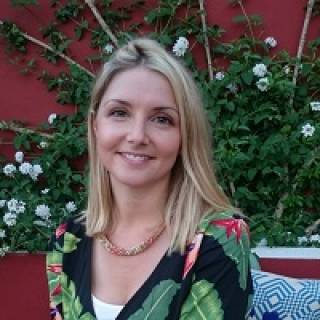
I was inspired to do the MSc course whilst working as an administrator for an Adult Acute Speech & Language Therapy (SLT) team after my undergraduate degree. I would be inputting data and organising appointments at the computer and couldn’t help but prick up my ears, as my colleagues discussed different types of stroke and how they affected patients’ language, or the various voice problems that can occur for teachers or singers, or how they were needed urgently to see a ‘nil by mouth’ patient. I began asking questions and eventually was invited to shadow one of the SLTs on the hospital wards. I was amazed that SLTs could work across so many different areas and seemed to draw on so many skills and different areas of knowledge; science, language, psychology and counselling, to name a few!
So, after a short stint in the more corporate world of pharmaceutical public relations; in which I found myself mainly sitting behind a desk, I applied for the course. After stressing out over emails late at night in the office and staring at press releases, I was very eager to work with people and keen to make a difference. I always had my heart set on the adult acute area and got my first job shortly after we handed in our dissertations in second year – as did most of my peers, there were and are plenty of jobs out there!
I joined a small, friendly and incredible supportive team at Darent Valley Hospital in Dartford, where I continued to learn a lot; mainly about swallowing (dysphagia). My job was (and still is) to assess patients on the wards who experience dysphagia, from very unwell critical care patients right through to patients who experience mild swallowing difficulties due to their age.
After my first year of work, I expressed an interest developing clinical skills in other areas of SLT and began working twos day a week with people who have voice problems and also with people experiencing swallowing and communication difficulties due to head or neck cancer. I love my job because I never really know what I am going to see each day and it is full of problem solving, lateral thinking and draws on my knowledge and interest in lots of different areas.
My PR skills haven’t been wasted; a really important part of NHS working is the need to shout about SLT and what we can offer as a profession. Since I have been working at Darent Valley Hospital we have been involved in lots of activities to do this, such as a meet and greet for our patients with our local MP and we also made a video about ‘the day in the life of an SLT’. If you want to find out more about SLT, you can watch it here on YouTube. Our efforts were recognised and we were invited to accept a ‘Giving Voice’ award, presented by HRH The Countess of Wessex, who is a patron of the Royal College of Speech & Language Therapists. That was obviously an incredible experience and a big pat on the back. Despite that, the biggest sense of job satisfaction just comes from doing the job itself, as you are constantly helping others. Sometimes there are difficult days and at times it can be frustrating working in the NHS, but it is massively outweighed by the feeling you get at the end of a good appointment or a busy day.
If you are interested – at any point of your career or life – it’s not too late to become an SLT, I urge you to find out a little bit more and apply for a course.
 Close
Close

